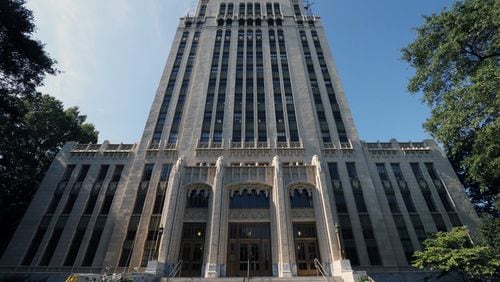In a wide-ranging January inaugural address, Atlanta Mayor Keisha Lance Bottoms said “I believe that transparency enables good government.”
Mayor Bottoms is spot-on in that belief, and the best opportunity toward cementing that goal firmly into place is now before her and the Atlanta City Council. It is in the form of proposed legislation that would help vault the city to first-in-class in empowering the foundational principle of democracy that government’s workings should be plainly visible to the governed.
The measure, and related follow-up action, is greatly needed. And it should be approved and enacted without delay.
Expeditiousness is important because the pending ordinance did not arise from a vacuum, or a vague, feel-good, campaign promise talking point that can be quickly forgotten in a rush back to business as usual at City Hall.
Far from it. The public and other governmental agencies are still exploring the depth of just how much went wrong at City Hall during the administration of former Mayor Kasim Reed. What has already become known is stunning as an indicator of just how much swept off the rails in how the city did business while simultaneously scoffing at expectations that its actions be transparent and readily visible to the public.
As a result of that arrogance, investigators are now probing what’s shaking out, frankly, to be a head-shaking mess. It’s a tale of a city government apparently operating in an atmosphere where cynicism was perhaps outweighed only by a propensity toward profitable cronyism.
It all amounts to a confusing puzzle whose pieces are now being painstakingly assembled by investigators, including the U.S. Attorney’s office. But what’s known now basically fits into two large buckets.
The first is a federal investigation into allegations of wrongdoing in city contracting. A team said last month to include nine federal prosecutors is examining this matter. That’s a significant application of resources, and hints at the depth or breadth of what prosecutors believe may be amiss.
So far, prosecutors have charged six people, including three high-ranking former officials in Reed’s administration. Five have already pleaded guilty. They include the city’s former top purchasing officer and a former deputy chief of staff to Reed.
Other astounding examples of poor governance have also been discovered. Reporting by the AJC and Channel 2 Action News questioned more than $800,000 in bonuses handed out at City Hall during the final days of 2017, including such goofiness as prizes for raffles and an ugly sweater contest. A law firm’s report found Reed’s administration, along with the City Council, violated the state Constitution in awarding the bonuses and prizes. Another report authored by the city auditor and ethics officer found the bonuses and prizes violated both city and state law.
Even viewed in mid-stream of the investigation, it all makes for an astounding narrative of government gone awry. And that is before even considering related problems of public transparency.
They arise because the city of Atlanta has also failed spectacularly in how it has answered to the public when questions have been raised about city affairs.
Bad things can readily happen when the people’s business is routinely conducted in the dark. Far too much of that has occurred in Atlanta during one more than one previous mayoral administration.
That’s the back wall against which the current transparency improvement initiative must be considered.
It’s easy to see why comprehensive, thorough changes are overdue. Had city officials been required to be more forthcoming on more things, at least some of the problems and abuses now being dragged into the light of disclosure could likely have been avoided. The city and its taxpayers alike would have benefited from that being the case.
It’s by design that the first words of the U.S. Constitution are, “We the people.” That popular sovereignty is a foundation upon which the American concept of governance rests.
That time-polished process can only work effectively when citizens’ right to know what’s going on with their government and their public dollars is not hindered by those who see opportunity in fueling smokescreens and opacity intended to obscure what’s really going on.
When government is not forthcoming and open, a toxic haze of broad skepticism, and even cynicism, by the public around public actions and motives is a likely result.
Which brings us to noting that, in addition to the U.S. Attorney’s ongoing work investigating City Hall corruption allegations, Georgia Attorney General Chris Carr’s office has also been investigating the city around alleged open records violations.
This newspaper and Channel 2 filed a complaint in April with the Attorney General, alleging a culture of “political interference” with open records requests. The two news organizations had ample reason to make that assertion. Investigative reporting had unearthed revelations that, as the complaint put it, “public officials have interfered with, caused delay in, or intentionally obstructed the production of public records – particularly when WSB-TV or the AJC sought public information that city officials perceived as politically embarrassing or inconvenient.”
Our filing with the Attorney General also requested mediation intended to help implement reforms. The ordinance to be considered Monday is the result of months of negotiations to correct what the news organizations described in the complaint as “a pervasive culture of non-compliance” with the Georgia Open Records Act.
We believe our extraordinary efforts to learn what is really going on are justified. What other conclusion could reasonably be drawn from a reporting investigation which has found that, in response to public records requests, some city officials apparently willfully collaborated to “be as unhelpful as possible” or “provide the information in the most confusing format available,” to use their own words from text messages.
Outrageous and cynical attempts at obfuscation of public business should have no place in a city with aspirations as high as Atlanta’s, we believe. Our shared, storied legacy and promising future each deserve far better than that. Taxpayers too.
Which is why we’re hopeful that a still-new Mayor Bottoms and the Atlanta City Council will do the right thing and quickly enact open records legislation worthy of a great city and region.
The proposal calls for creating a new city Transparency Officer, who would have real power to set up comprehensive systems of accountability aimed at ensuring the city consistently complies with Georgia open records and ethics laws.
Among its tenets, it calls for:
- Putting forth new policies and procedures regarding use of private email accounts, private cell phones and private messaging apps by city employees to conduct official business.
- Mandatory annual training regarding compliance with the Georgia Open Records Act for employees, elected officials and other staff.
- City officials and employees currently required to file financial disclosures would be required to take mandatory training regarding the Georgia Ethics in Government Act.
The package also calls for creation of a City of Atlanta open records website that would provide timely, comprehensive information about records requests received, their disposition, and how to contact those responsible for fulfilling them.
After the ordinance is enacted, the transparency initiative also promises to hold the city responsible for doing more to create a comprehensive plan for best-in-class protocols and procedures for achieving compliance with the state Open Records Act.
All-in, it makes for a well-reasoned, well-needed package for achieving the desired result. It has been described by those who know such issues as being a strong, thorough and extraordinary push to improve city transparency and recover from missteps of previous administrations.
Depending on final City Council scheduling, it’s possible that the effort could come up for a vote as early as this Monday.
Mayor Bottoms and the Council should learn from the multiple, unfortunate examples summarized above. Before them awaits a great opportunity to help set Atlanta city government onto a new, better, more-honest and more-productive path. As the literal and figurative center of this great, far-flung metro, nothing less should be acceptable. There really is no other correct choice than to pass these measures.
Now is the time for the new Bottoms administration and the council to separate themselves from the clouds of suspicion and even wrongdoing that have been stalled over City Hall for too long. The previous municipal atmosphere of resistance and a willingness to pick unnecessary fights eroded trust in the city by both citizens and the private sector alike, we believe. In the process, legitimate accomplishments by city government were at times overlooked or overshadowed.
It’s time for that to change; and for Atlanta to move forward. Passing the transparency package is the best way to powerfully begin doing just that.
About the Author







